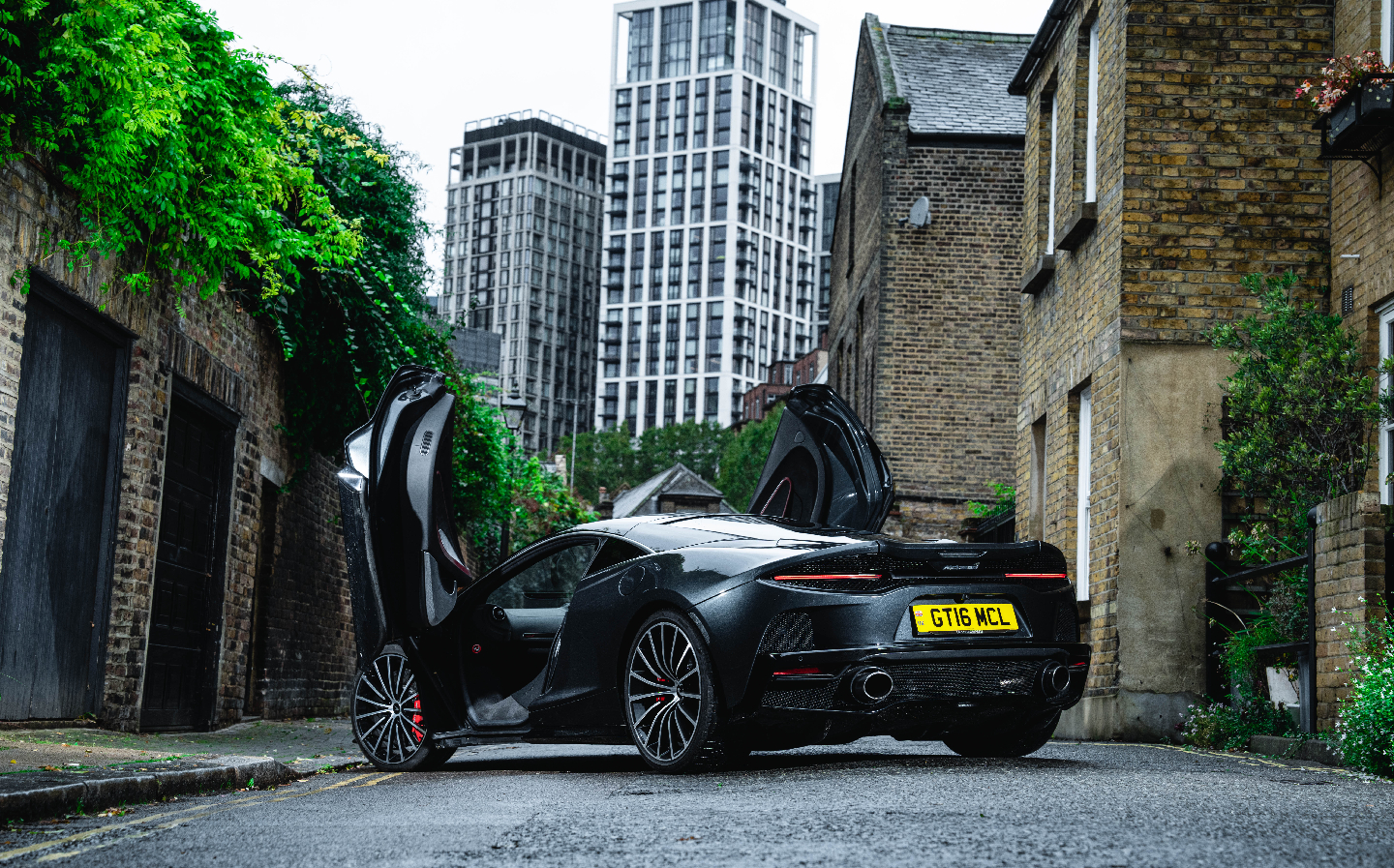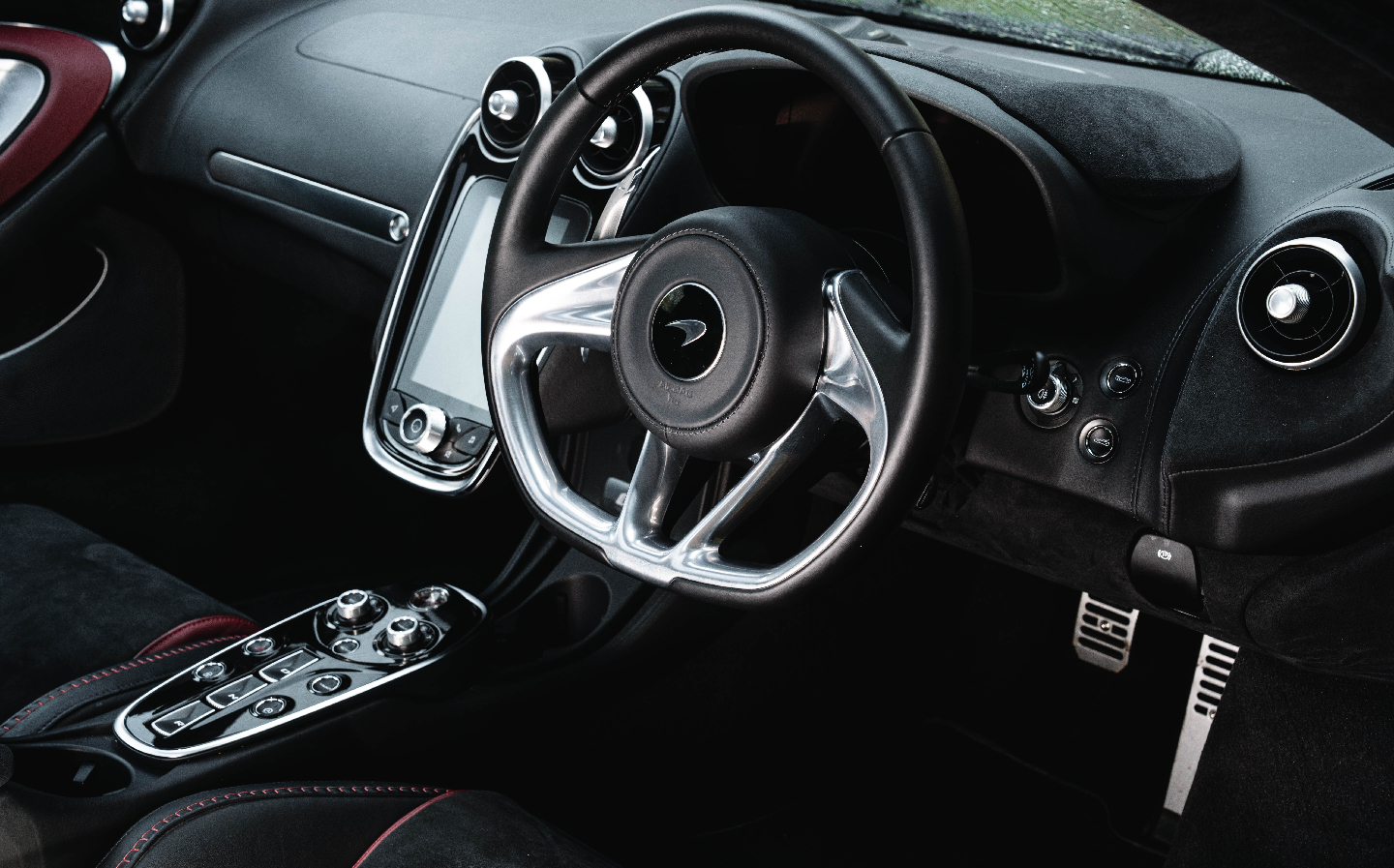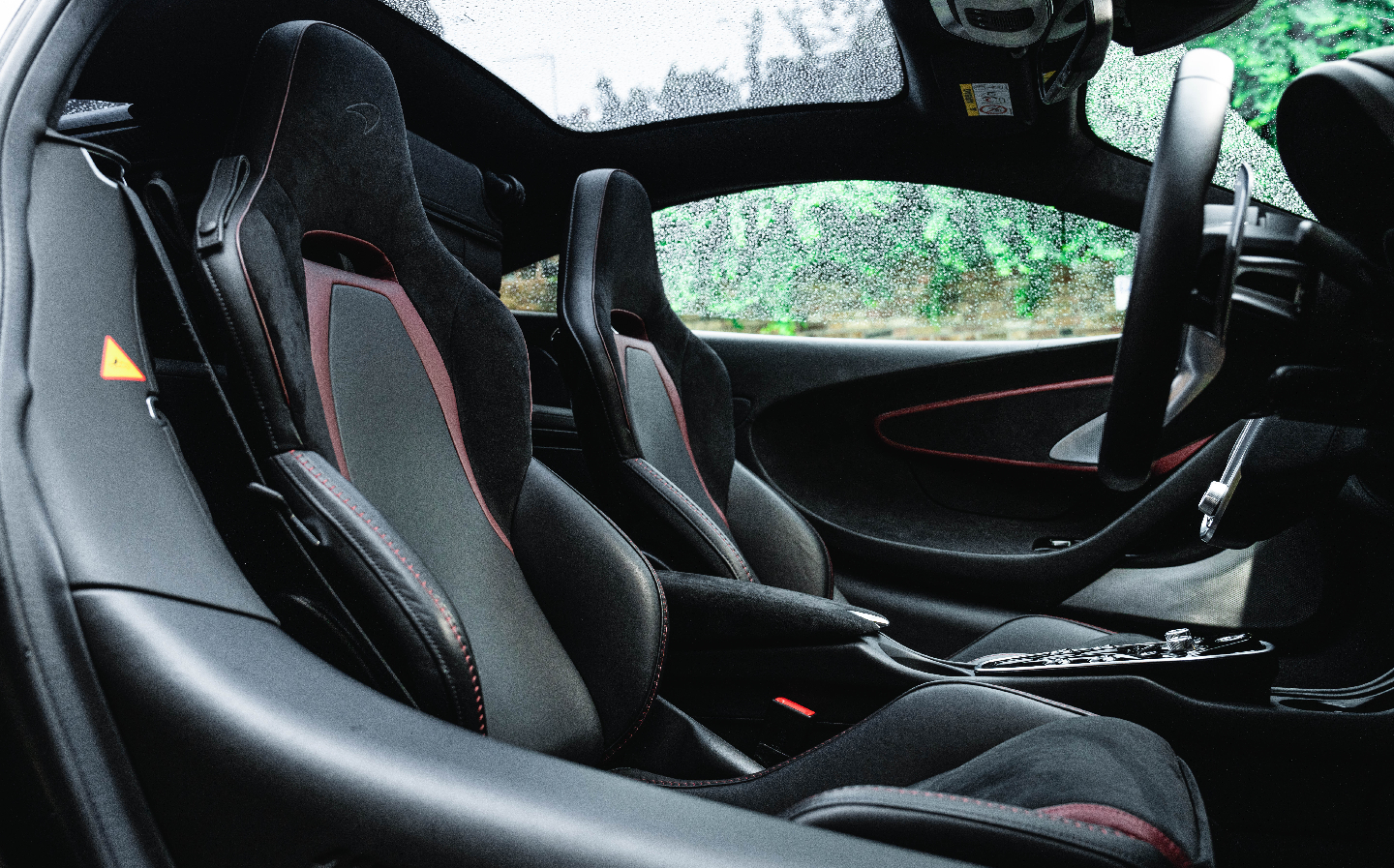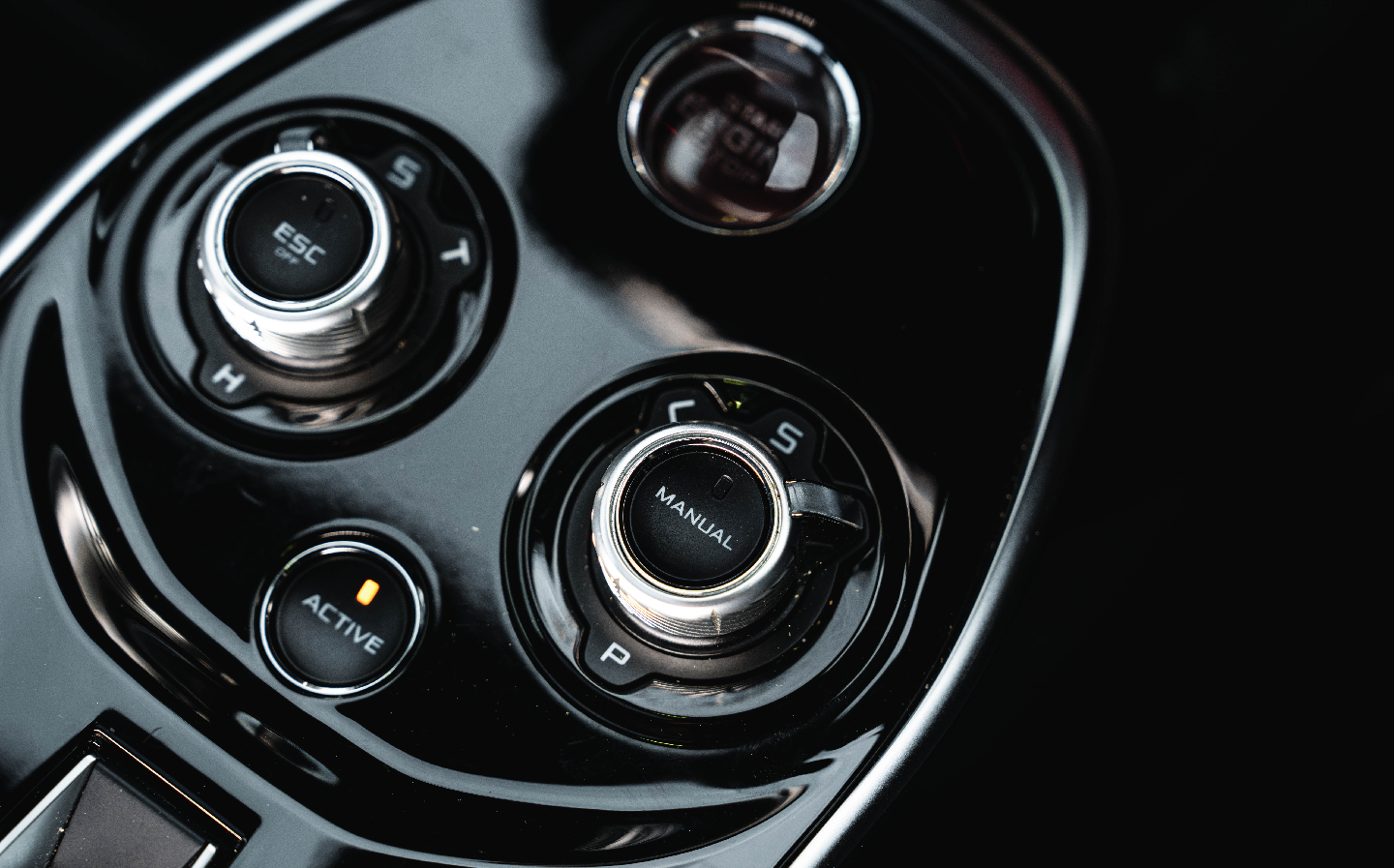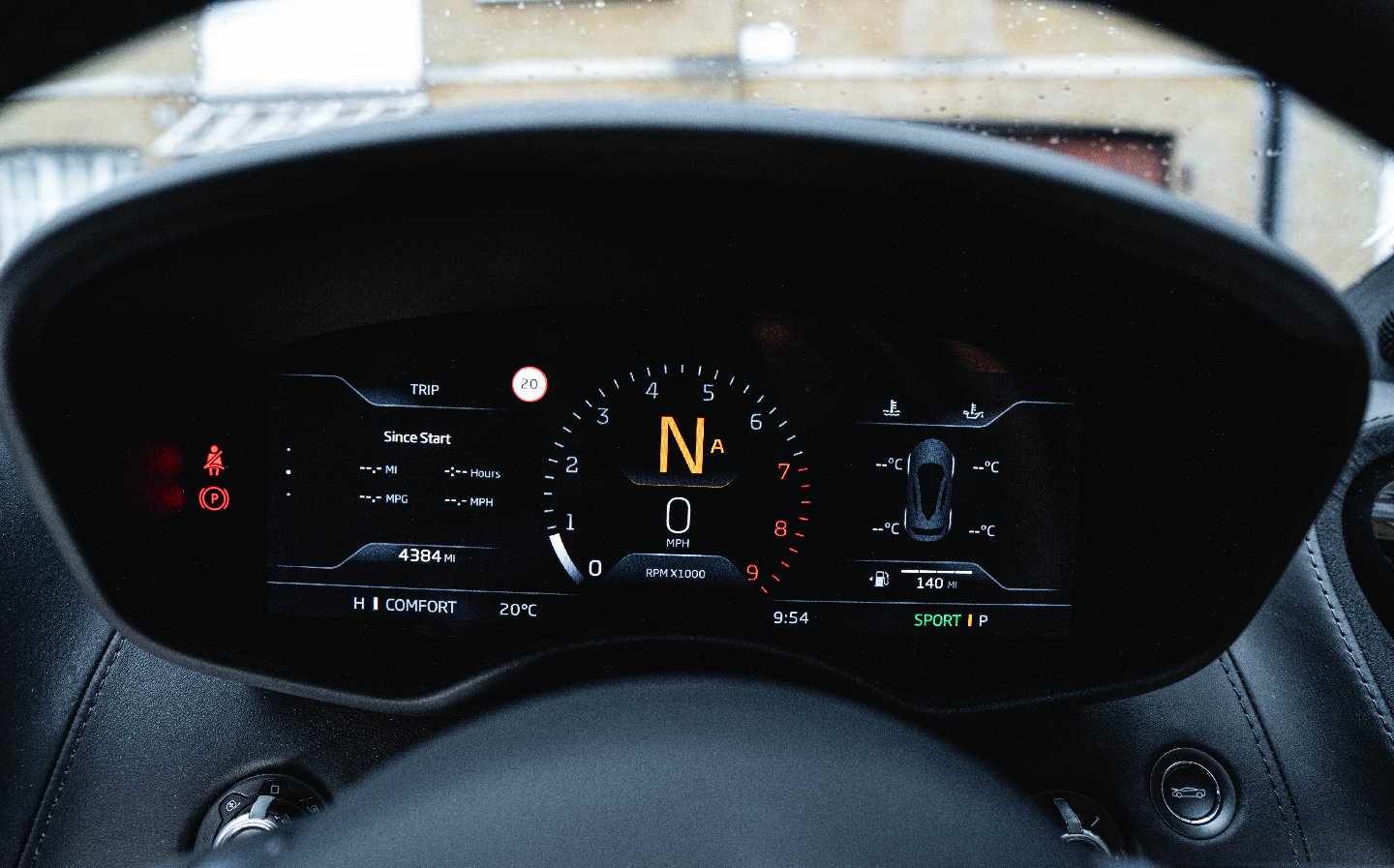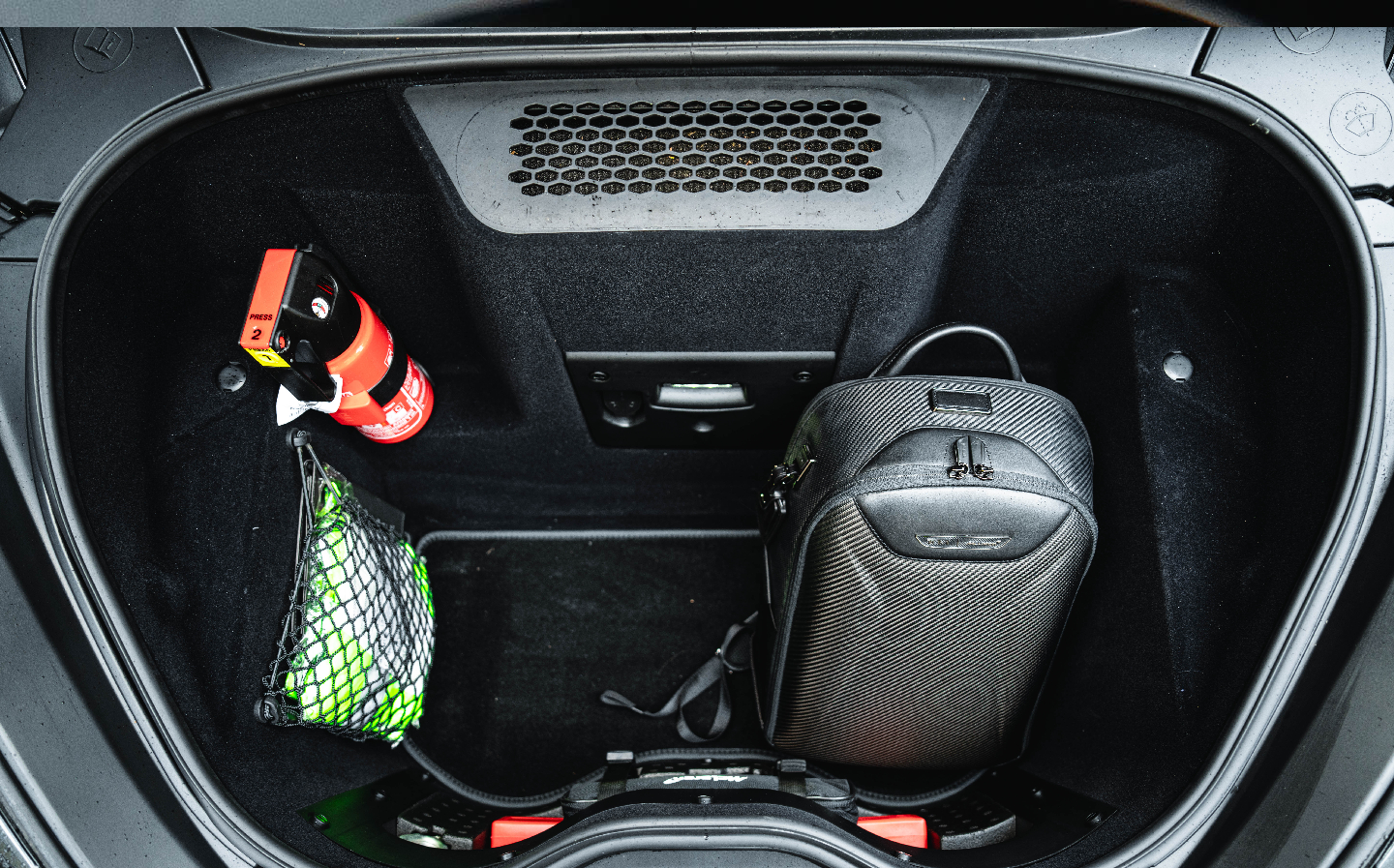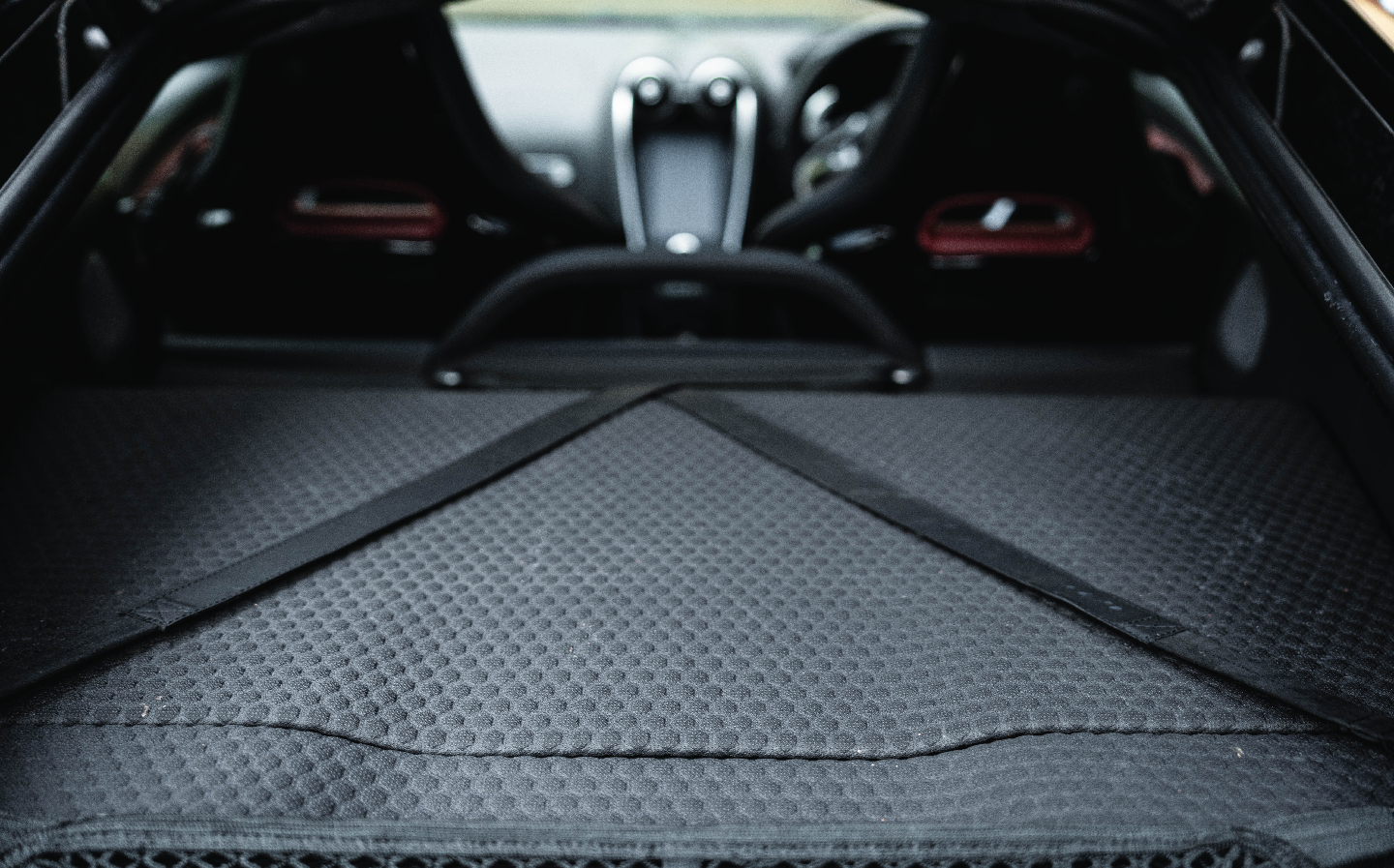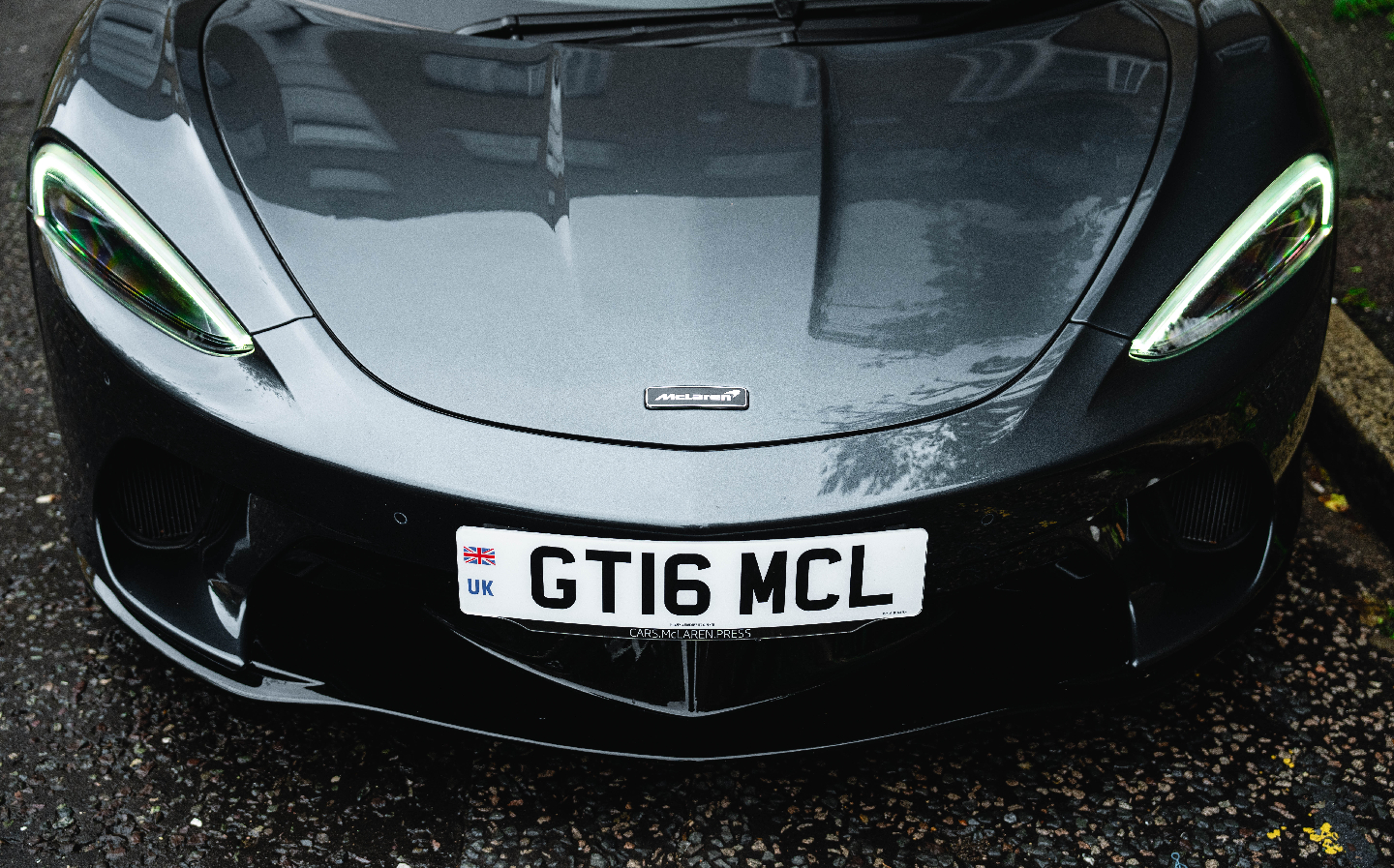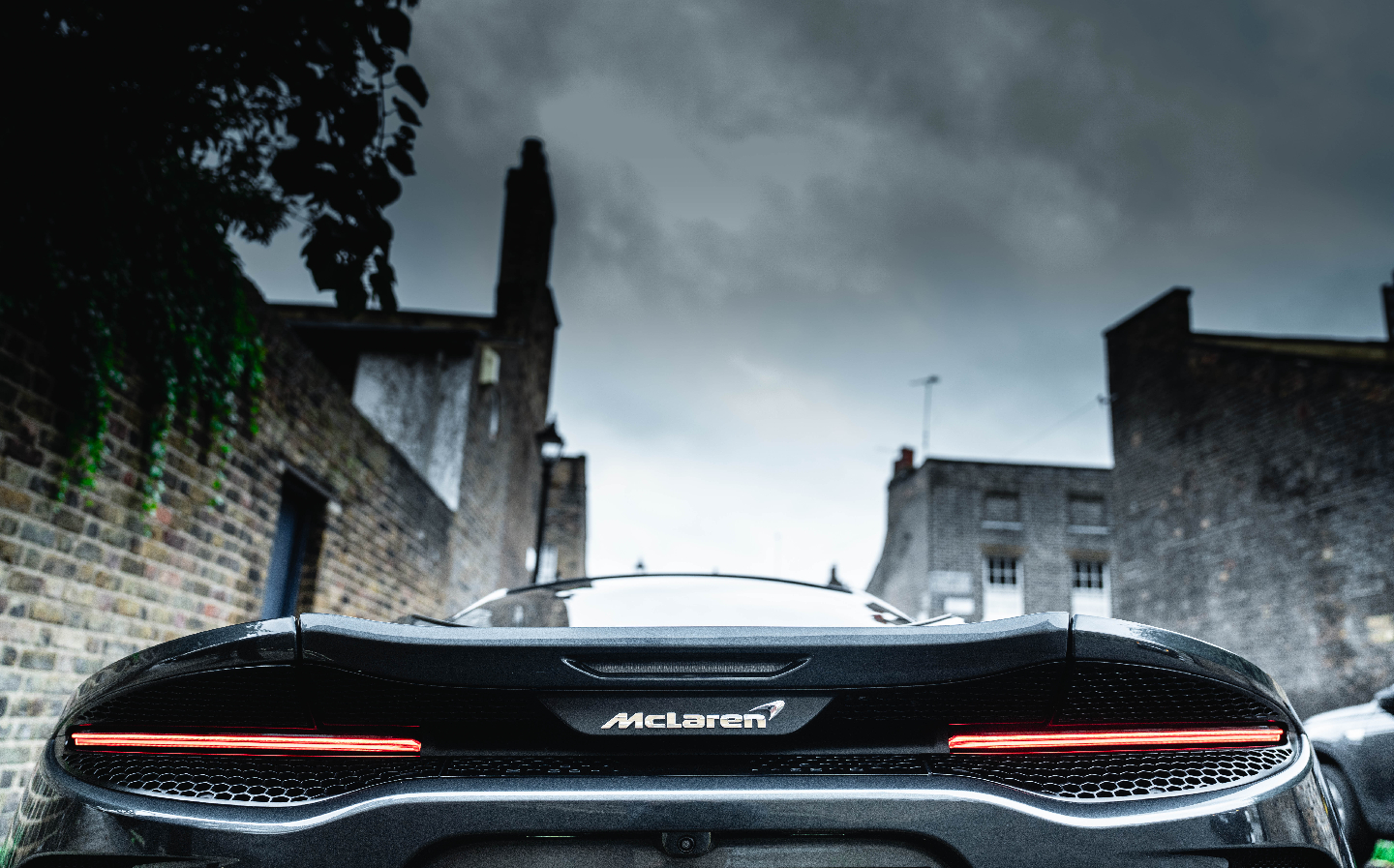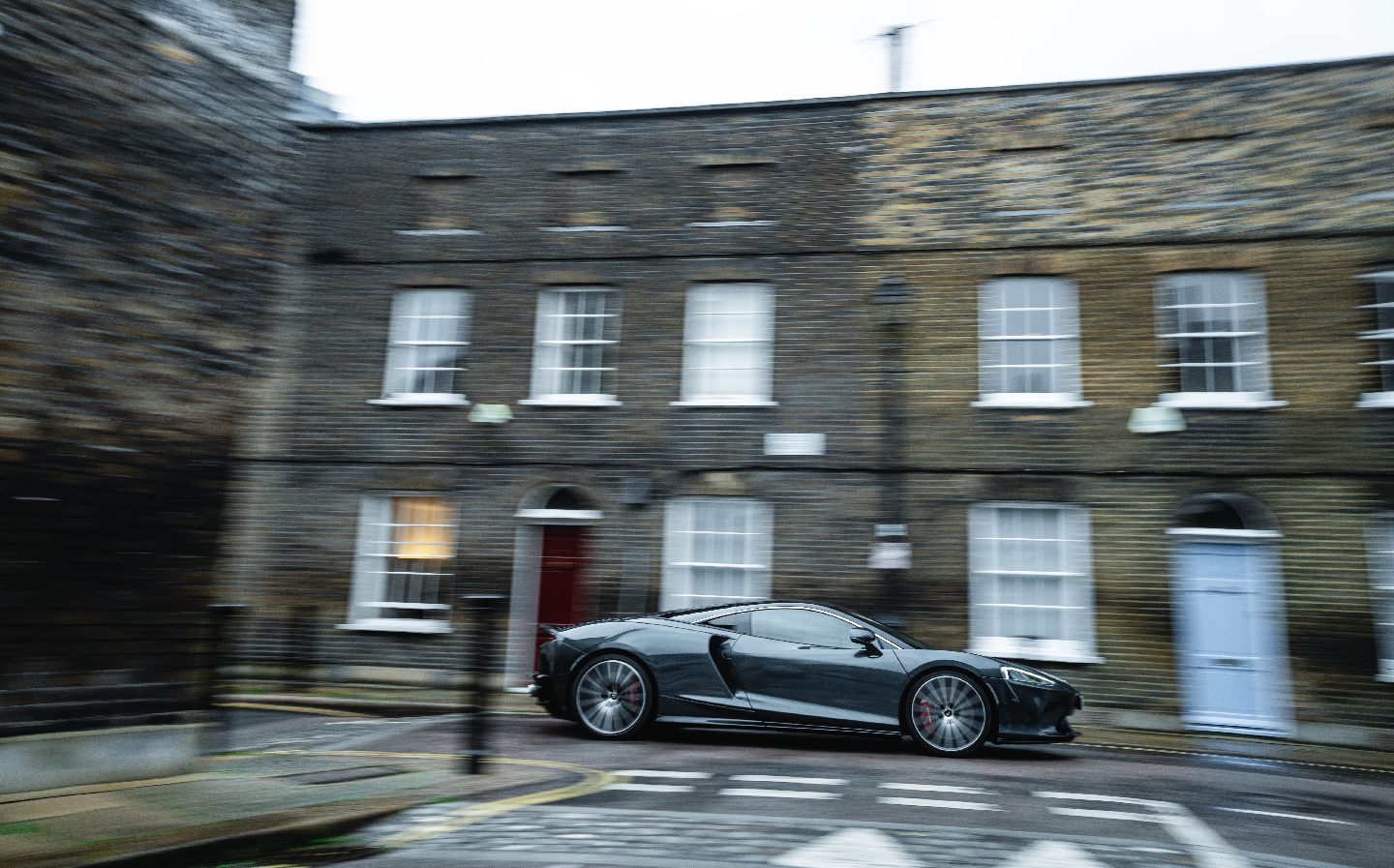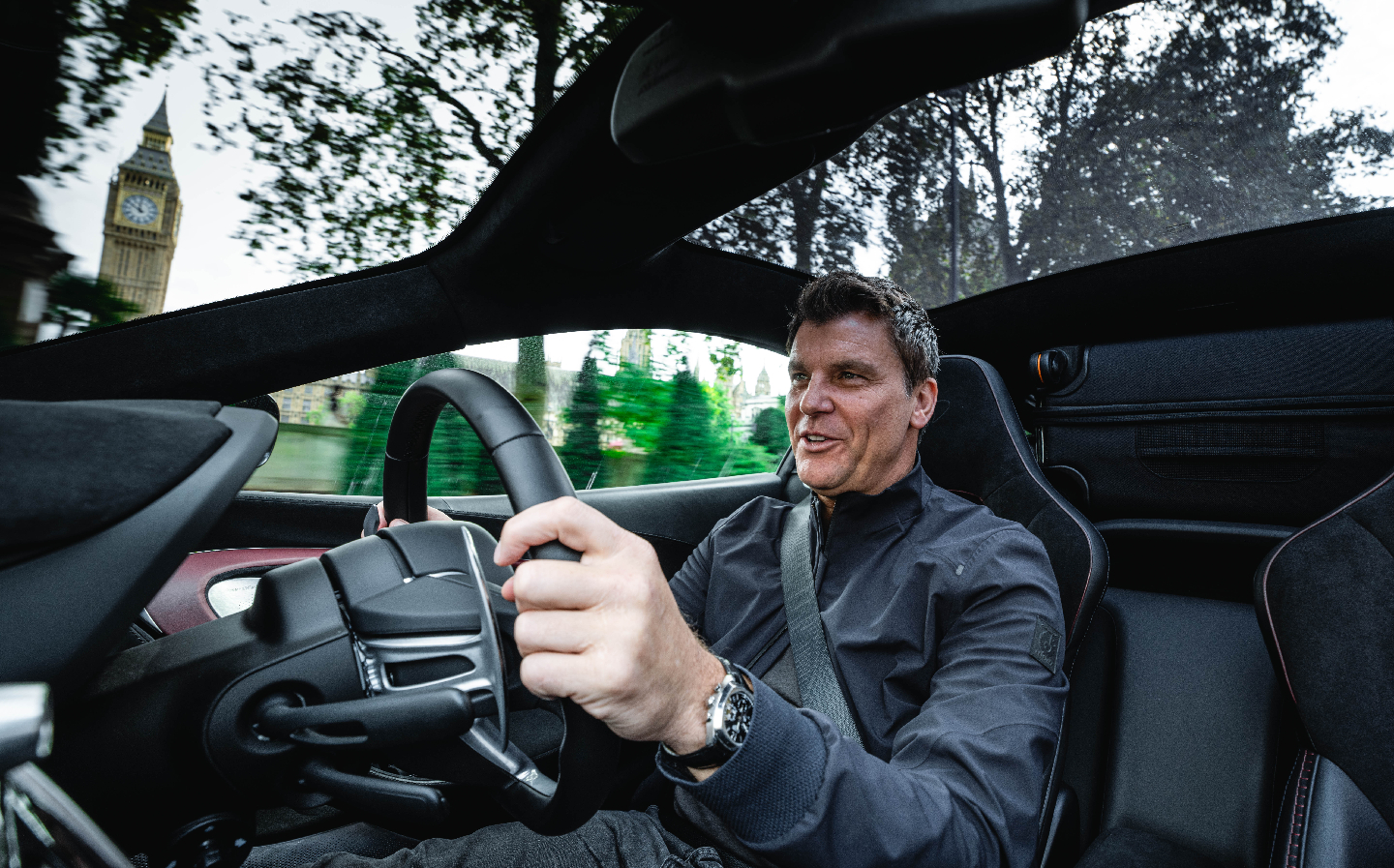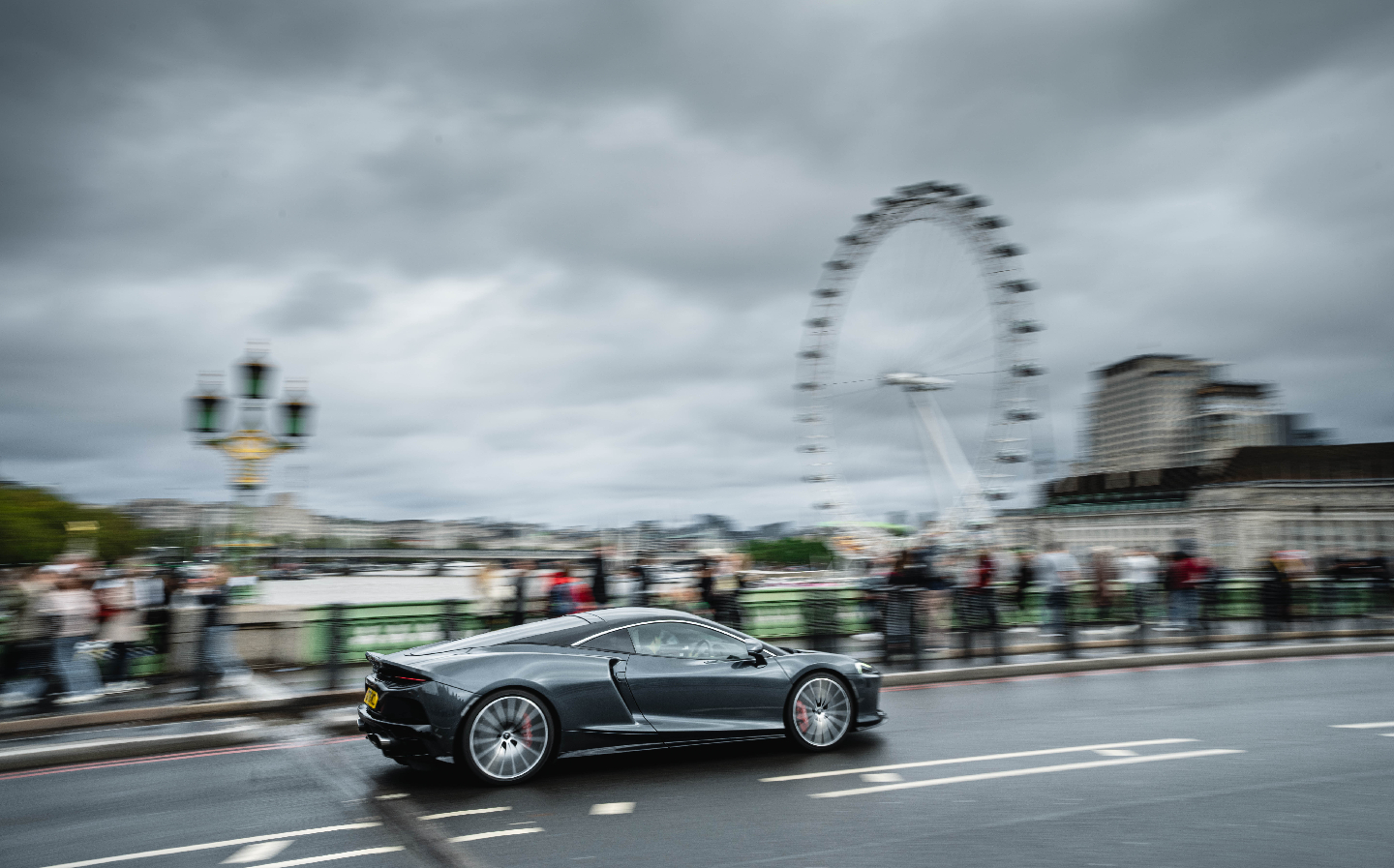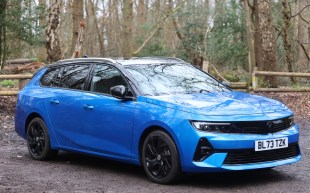Extended test: McLaren GT review
The world's most unconventional grand tourer has its legs stretched by David Green
McLaren GT specifications
- Model 2022 McLaren GT Pioneer
- Base price for this version £166,300 (inc. VAT; exc. local fees and taxes)
- Price as tested (with options) £186,180
- Options Pioneer Pack £0; MSO Paint – Sarthe Grey £7,500; Panoramic Privacy Glass Roof £500; Privacy Glass £4,800; Bright Pack £4,800; Sports Exhaust £0; Wheel Finish – Gloss Black Diamond Cut £1,800; Practicality Pack £0; Premium Pack £0; Milled From Solid Aluminium Pack £930; Special Colour Brake Calipers – Red with Silver Logo £1,420; Armrest with McLaren Branding £300; Luggage Retention Strap £530
- Engine Mid-mounted 3,994cc twin turbocharged petrol (M840TE)
- Transmission 7-speed SSG automatic with manual mode, rear-wheel drive
- Power output 612bhp @ 7,500rpm
- Torque 465 lb ft @ 5,500-6,500rpm
- Top speed 203mph
- 0-62mph 3.2sec
- 0-124mph 9.0sec
- Fuel consumption (WLTP combined cycle) 23.7mpg
- CO2 emissions (WLTP) 270g/km
- VED (road tax) £2,605 for first year; £570 for years 2-6; £180 thereafter
- Kerb weight (DIN – fluids & 90% fuel) 1,530kg
- Seats 2
- Luggage capacity 570 litres (420l in rear, 150l under bonnet)
Test details
- Test period October 2023 – January 2024
- Starting mileage 2,449 miles
Test updates
- October 30, 2023: The most sensible daily driver we’ve ever tested?
- December 15, 2023: Supercar or GT?
- January 17, 2024: The best-looking McLaren
- January 25, 2024: All good things…?
Oct 30, 2023: The most sensible daily driver we’ve ever tested?
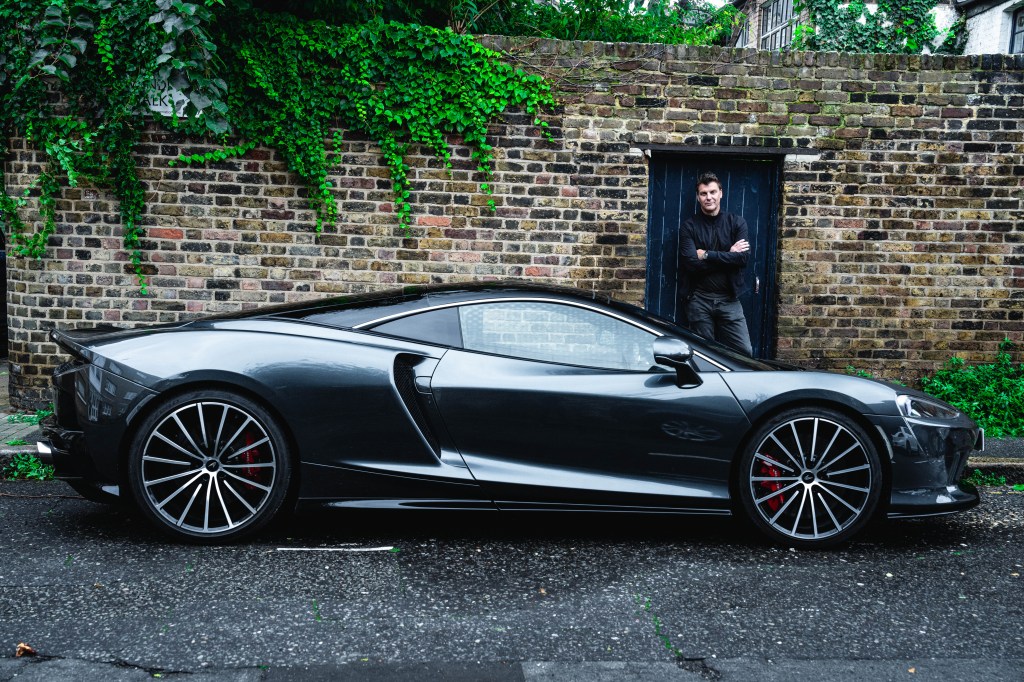
The first thing to say about the McLaren GT is that it earned me an embrace from my neighbour. An arms open, joyous embrace. I have to admit it took me by surprise.
I was slightly dubious about bringing my McLaren extended test car home. To passers-by, I have just upped the ante in the car stakes and joined the “supercar” club (McLaren classes it as a grand tourer, for reasons I’ll come onto in a moment, but to most onlookers the supercar label will be apt).
And as we know, driving a supercar can be a double-edged sword. Yes, I now get the daily pleasure of driving a finely tuned laser-guided missile of a car, but there are always the connotations of in-your-face supercar ownership to consider. How will people react, with pleasure or with disdain?
That was what was going through my mind as a previously unspoken to neighbour approached me in my peripheral vision as I was opening the car.
“I’ve been waiting to speak to you since I saw this car,” he said ambiguously. Was he going to berate me for an early morning enthusiastic engine rev or a slightly slithery getaway down the street? To my relief, he said, “It’s such a lovely thing. I love it,” as he reached out his arms. “I enjoy walking past it every day”.
I was genuinely taken aback but accepted the hug graciously. This supercar ownership thing may not be so bad after all.
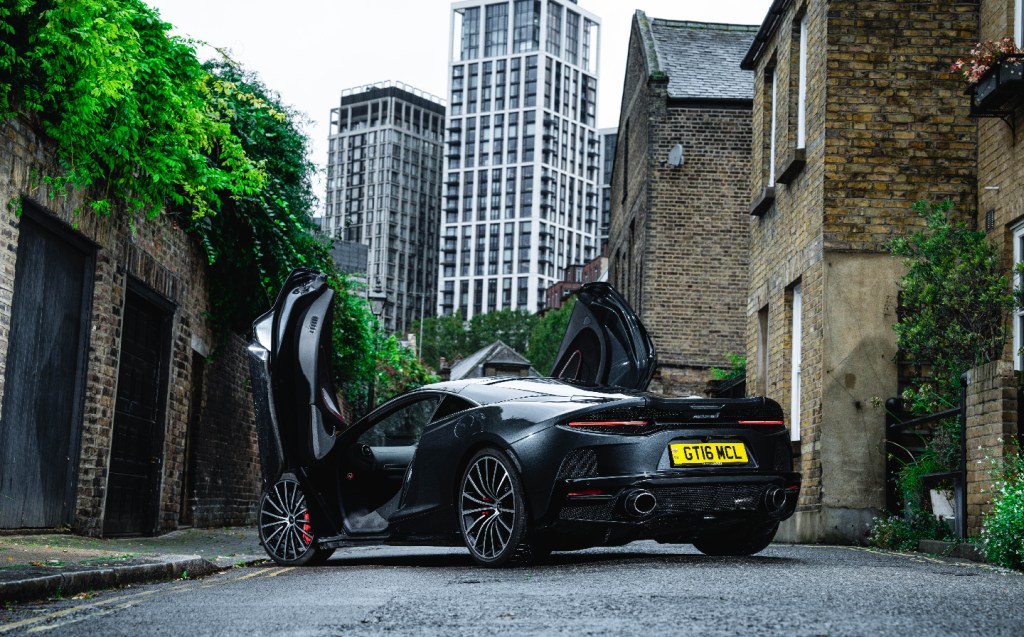
Of course, I was never going to turn down the chance to test a McLaren GT over a longer test. That would be silly. Yet I was somewhat relieved when I picked up the GT at McLaren HQ in Woking and saw that the car was in the somewhat hushed tones of Sarthe Grey with a gloss black roof, front splitter and side sills.
I was entirely into trying out the GT for a few months but maybe I would have winced a bit if a Papaya Orange or Volcano Yellow version had been wheeled out. That may have been a bit too in your face. The subtle — and, in my opinion, very fetching — grey shade made me feel like I was obviously talking out loud about my new ride, but maybe not shouting too much. It’s a special order MSO (McLaren Special Operations) paint that’s a £7,500 option.
Especially effective are the gloss back and silver diamond cut wheels — 20in on the front and 21in on the back — giving this car a striking profile, especially with the optional (at £1,420) red, with silver logo brake callipers glinting behind the spokes.
Stepping inside, it gets even better. This GT has the Pioneer Pack, a no-cost option that features Carbon black softgrain aniline leather and Alcantara seats with contrast Barolo piping and stitching.
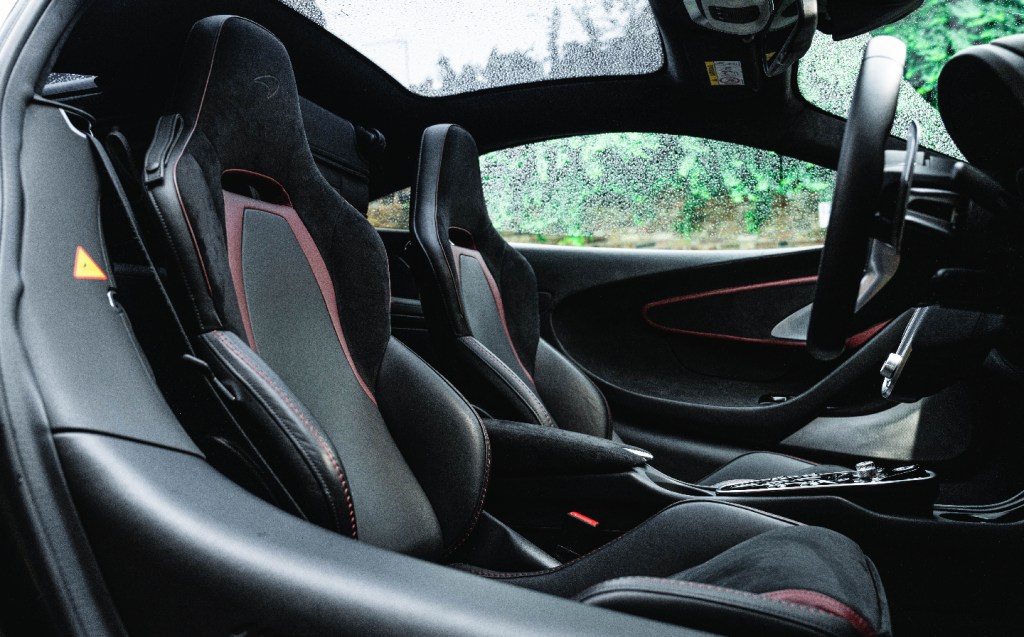
So this is a very well-specced McLaren, and even though I had to get in via dramatic up-swinging dihedral doors, this is as subtle an entry into supercar ownership as I could imagine.
And that’s the USP of the McLaren GT. Yes, it’s an ultra-low dart-shaped car with a carbon tub and a 4-litre twin turbo V8 engine capable of 203mph, but as the name spells out (literally), McLaren wants us to think of this not as a track weapon but rather something to enjoy on a luxurious weekend away. Albeit at a rapid rate of knots, if you so choose.
Whether you buy that idea is another thing, but let’s looks at the evidence. The difference between the GT and its snarling, sporting siblings is that it has a large amount of storage space… for a McLaren. It has a deceivingly large front luggage compartment, with a capacity of 150 litres, that is easily big enough for a carry-on suitcase and rucksack.
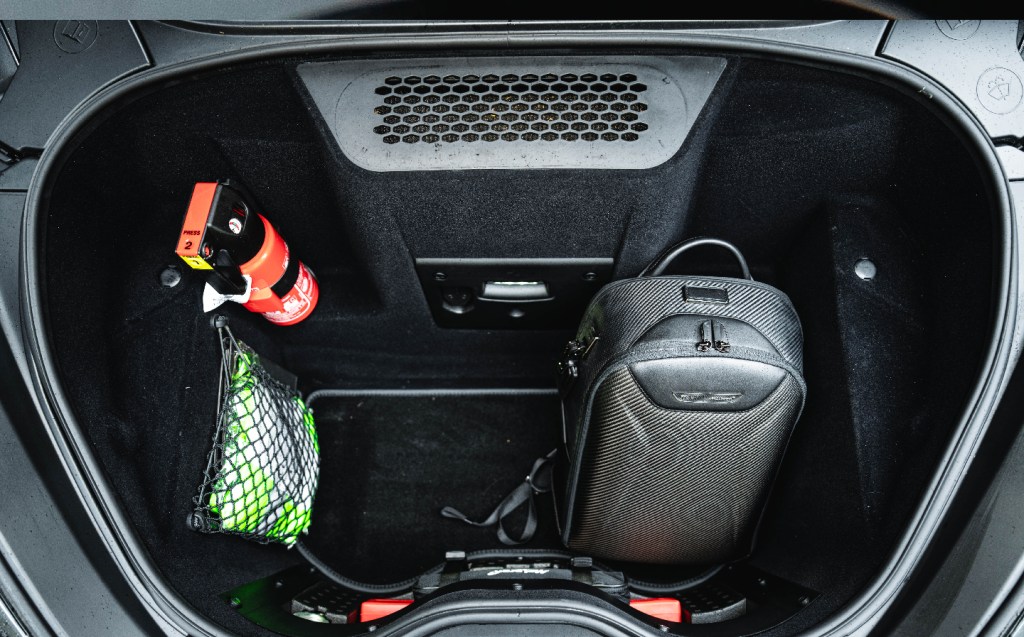
Press the other dash-mounted button or the key fob, and a large rear tailgate rises to reveal a surprisingly spacious rear luggage area. It achieves the extra space because its V8 sits lower in the car than other mid-engined McLarens, giving you another 450 litres in the back for a respectable 570 litres of total storage space, albeit with an unconventional shape.
And don’t worry about any precious cargo getting a little hot sitting on top of the engine, as McLaren has engineered some clever hot air channelling and shielding using Nasa-developed materials to keep the luggage space cool.
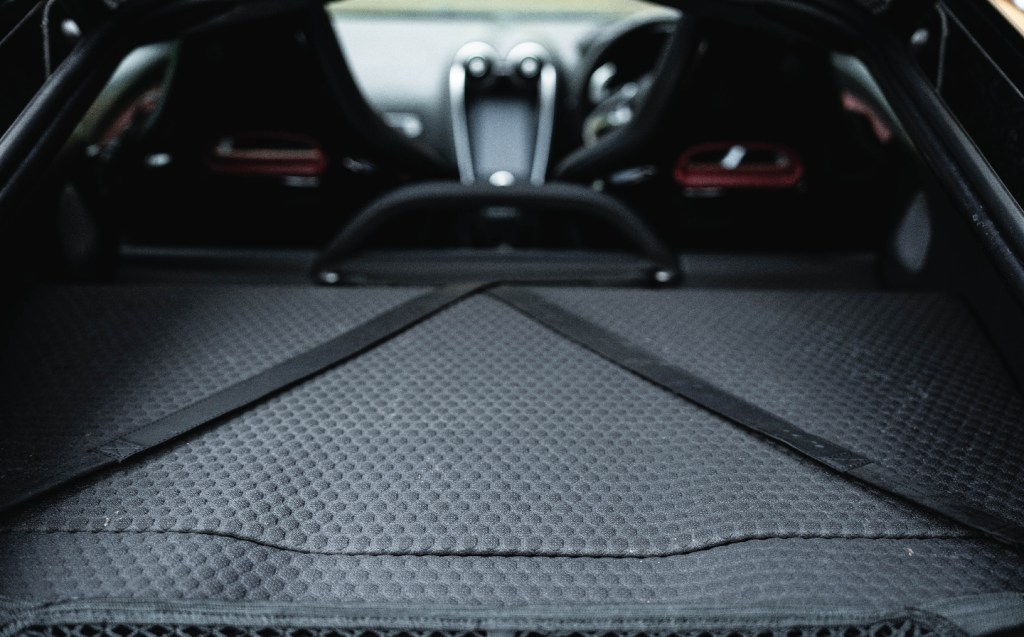
I look forward to loading the ample load space and getting on the road. I’ll report back on driving the McLaren GT and exploring whether or not “grand tourer” is an appropriate label. But for now, I’m enjoying looking at this machine as it sits just outside my window.
- Current mileage: 2,523
- Miles to date: 74
December 15, 2023: Supercar or GT?
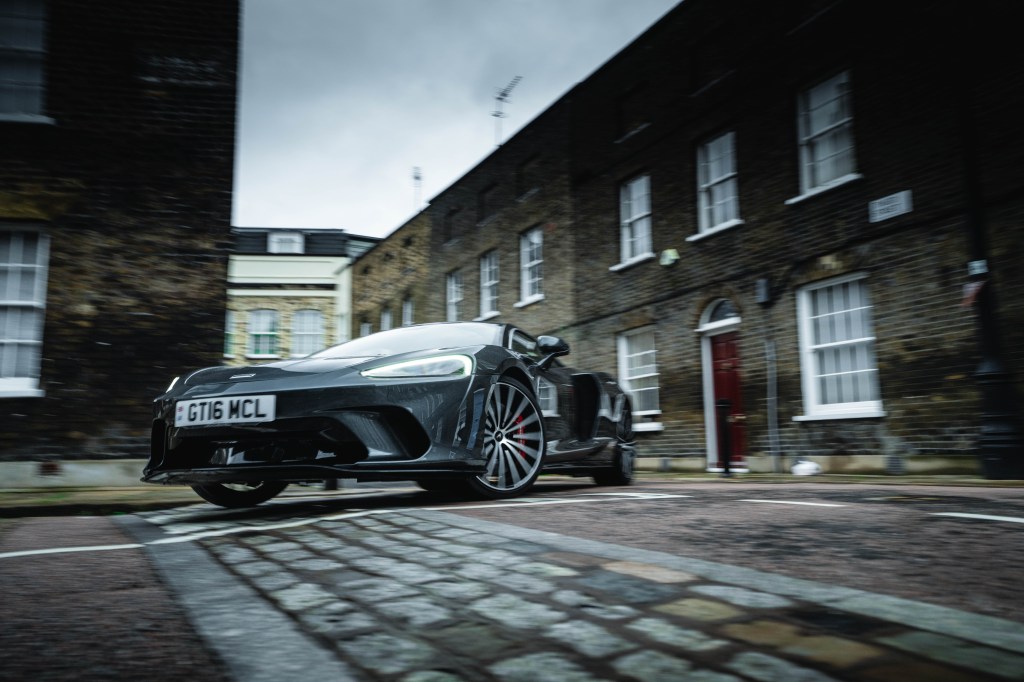
I have been the custodian of the McLaren GT for just over a month now, and things are going well. My initial concerns have turned out to be ill-founded.
The first was ground clearance at the front of the car. Anyone who lives or has spent time within the M25 knows that most of your time behind the wheel will be going up and down over the ubiquitous speedbumps around the capital. Performance cars tend to put little emphasis on a high approach angle, concentrating on downforce, so I was grateful to see my GT had been fitted with the Practicality Pack, which includes the hydraulic front nose lift option.
When lifted, the car has a similar clearance to a C-Class Mercedes. I anticipated using this daily but save for a particularly steep parking ramp, I have not needed to use it at all, which is surprising and pleasing.
With its load space and low-speed drivability, this car is proving to be easier to live with than I had predicted. McLaren’s typically low scuttle also gives excellent sight lines through the windscreen to the front of the car, making it easy to park, especially combined with the rear view camera that is another part of the Practicality Pack — a no-cost option on the GT that also includes front and rear parking sensors and electrically folding heated mirrors.
But let’s face it, applauding its surprisingly good manners in the city is all well and good, but it’s not why you buy this car. Luckily, I have escaped the confines of the M25 on numerous occasions this month, allowing the McLaren to stretch its legs.
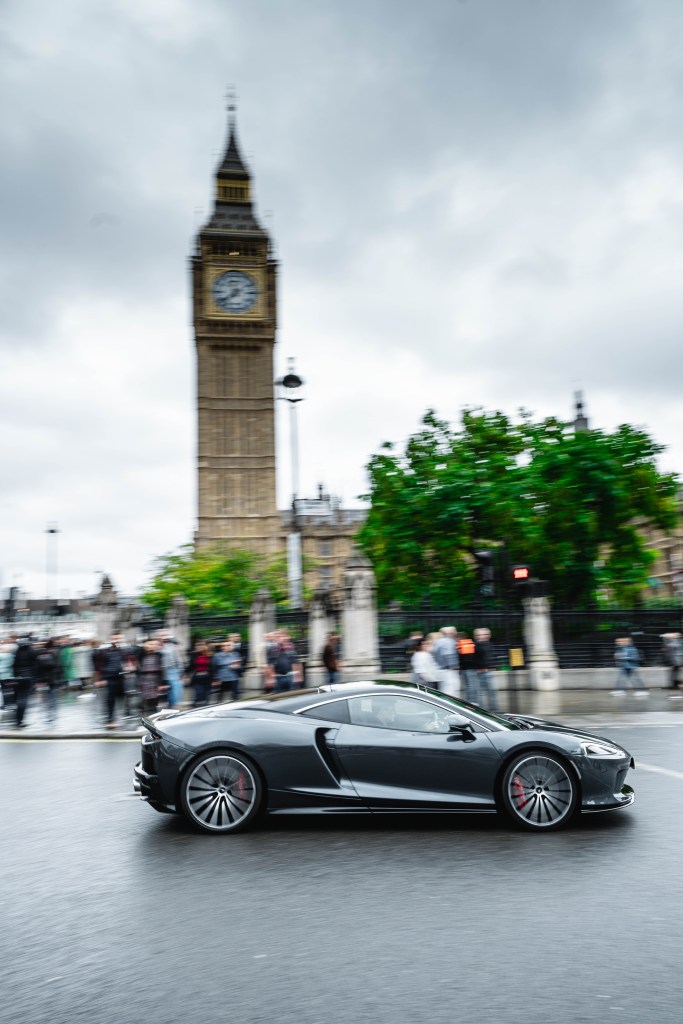
The question, I suppose, is how much do you lose at that sharp end of the performance in place of the practicality (it still seems strange using that word for a McLaren) of the GT?
If you live in the UK and want to use this car on public roads, the answer is not much in real-world driving. The GT does not have the new “easy reach” toggle switches for handling and powertrain modes as the Artura and the new 750S, but you still have the same regular McLaren modes, albeit by more conventional means of taking your hands off the wheel and adjusting two dials on the centre console.
Pressing the “activate” button before you turn the dials still seems an unnecessary extra step, but you soon get used to pressing that button as part of your starting sequence before you pull away.
When it comes to drive modes, Comfort is the default in the handling setting, especially on the pitted UK roads as we approach winter. But whether to stick or twist (the dial) once on the open road is a more nuanced decision.
In supercars, my temptation is to turn up the powertrain mode as soon as I step in, usually to the last setting. In the GT this means setting it to Track mode. At the very least, I would typically go for Sport as it sharpens up the car’s responses, including gearchanges …and loudens the exhaust note (which is good and bad depending on where you are).
Why? Well if you have a performance car why not have all the power at your disposal all of the time?
Yet Comfort engine mode in the McLaren GT proves to be a useful setting when you are pootling around town. The throttle response is more muted than expected but this makes for a more relaxed driving experience, especially in traffic.
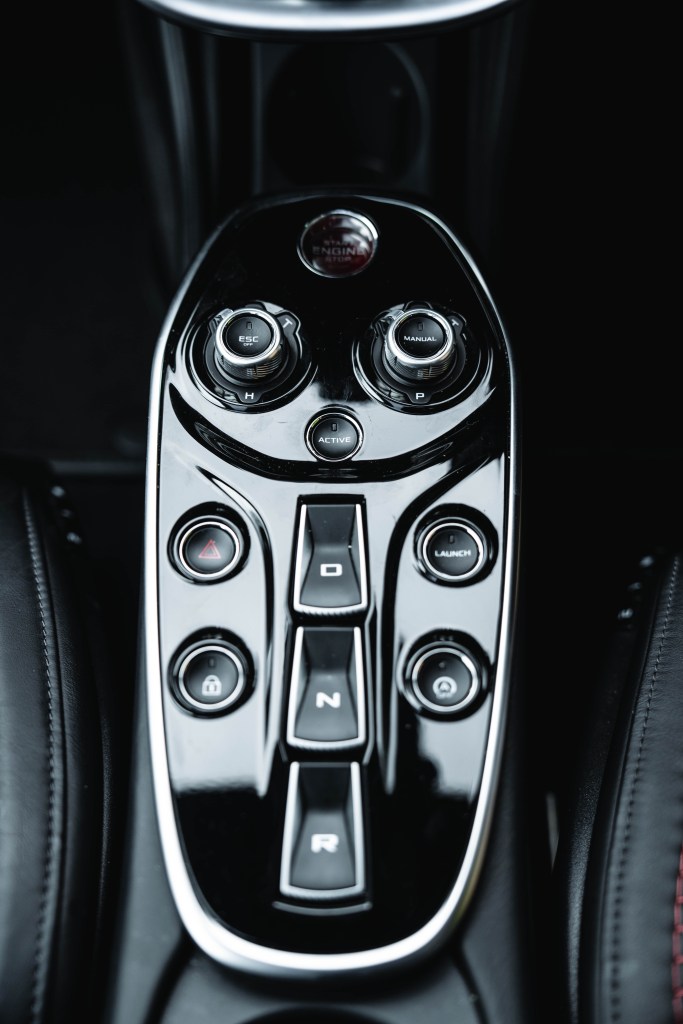
Knowing a sharper response is only a couple of clicks away means you can enjoy very smooth and gentle pull-aways without the jerky movement associated with some supercars. If circumstances change and you’re really in a hurry, the GT can be made more alert — more on that in a future update. It even has a launch mode, I notice.
The GT is very easy to live with, and that uncannily pliant McLaren ride is very impressive here, in the brand’s most sensible car. But you are still aware that you are driving something very fast, powerful and capable, and the only reason you would think your car was a bit soft is if you did a back-to-back test with something like the 720S or the new 750S.
And over a longer distance drive you would be glad of that difference. That, I suppose, is the reason for the McLaren GT’s existence. Mind you, the Artura is also comfortable over long distances and through town. I’ll be mulling over this a bit more next time.
- Miles to date: 884
- Average fuel economy: 18.8mpg
January 17, 2024: The best-looking McLaren
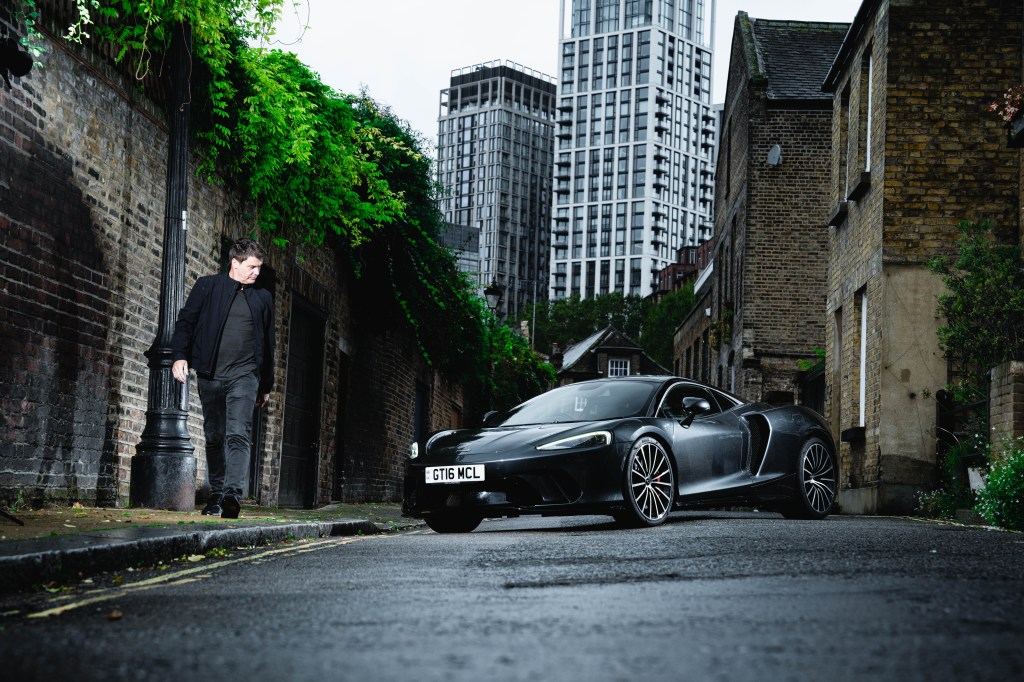
There is a time that comes along with any new car when muscle memory takes over, and you stop quizzically searching around for the switch or function you need. There is no longer a slight pause when you first drop your backside into the seat before firing the engine, no delay as you go for a quick flash of the headlights. I got there faster than most cars in the GT. It’s a capable and, at times, intimidating supercar, but it’s also simple and intuitive.
McLaren is sticking to its philosophy of purity in driving, and the lack of buttons or switches on the steering wheel is welcome, leaving the wheel in your hand for the pure act of directing the car’s travel. And that electro-hydraulic, power-assisted steering is sublime. The feel and feedback are something McLaren consistently nails.
The clutter-free approach extends to the rest of the interior. This is certainly no grand, sumptuous veneered cabin of, say, a Bentley Continental GT.
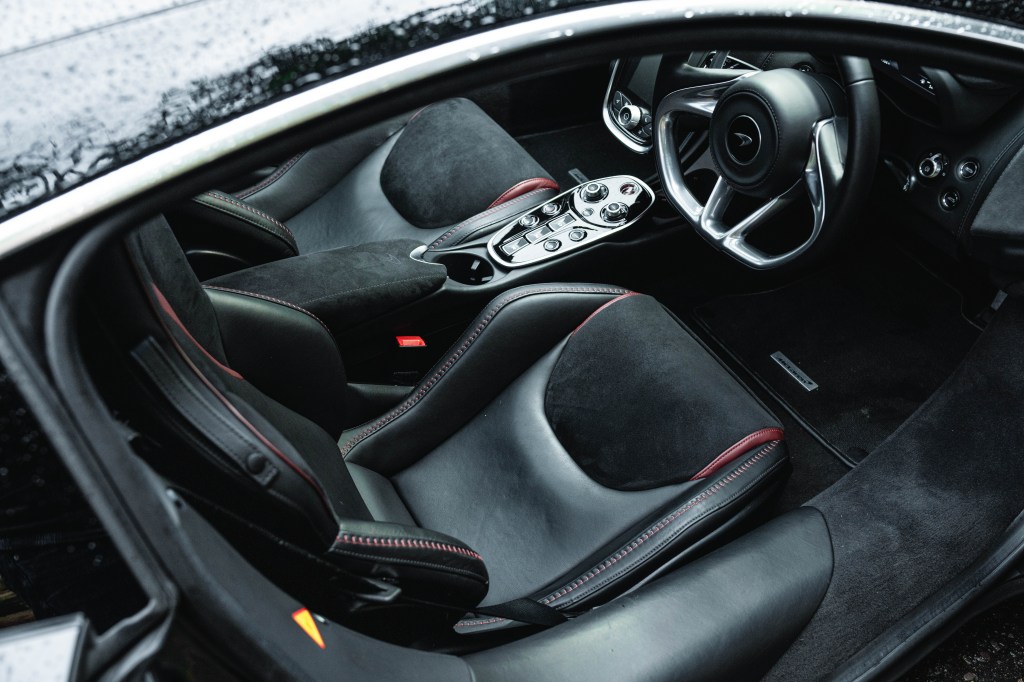
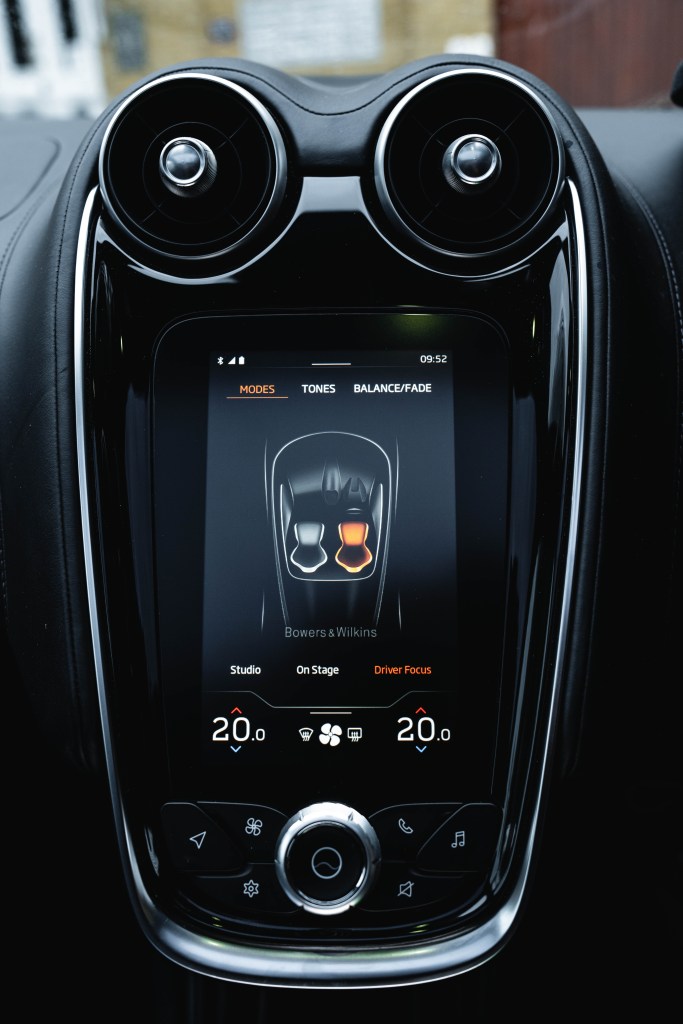
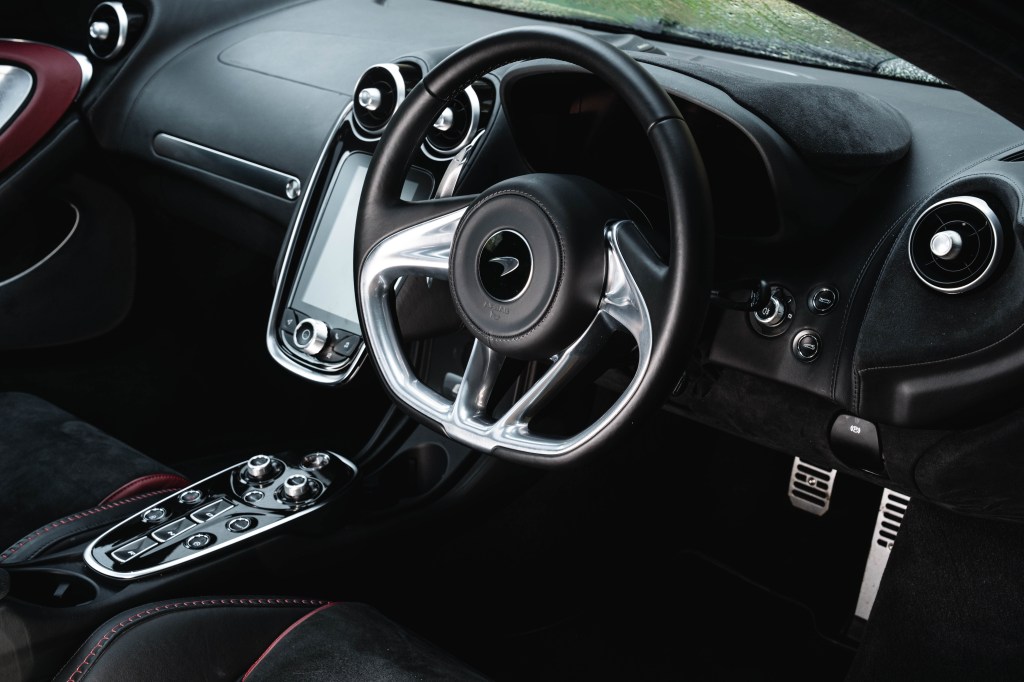
Yet this car is much lighter than the Conti or any other conventional grand tourer. If you believe the marketing blurb, McLaren has set out to offer an alternative option to the traditional tourer with something a little lighter on its feet and with more emphasis on the act of driving. It may not have as much horsepower as some rivals, but the extreme diet means it doesn’t need it, and it is class-leading in power-to-weight ratio.
After a few weeks of driving the GT, your initial raised eyebrow over its moniker disappears, and you start to buy into its nametag. Long trips are to be savoured, not dreaded.
McLaren needs this breadth of models if it wishes to broaden its appeal and seek out new buyers and fans of the brand. The Artura (pictured below) is another in the line-up with a unique flavour to entice buyers. It’s also impressively lightweight (especially for a plug-in hybrid) and offers an interesting alternative to the GT, especially if you like the idea of a hybrid supercar.
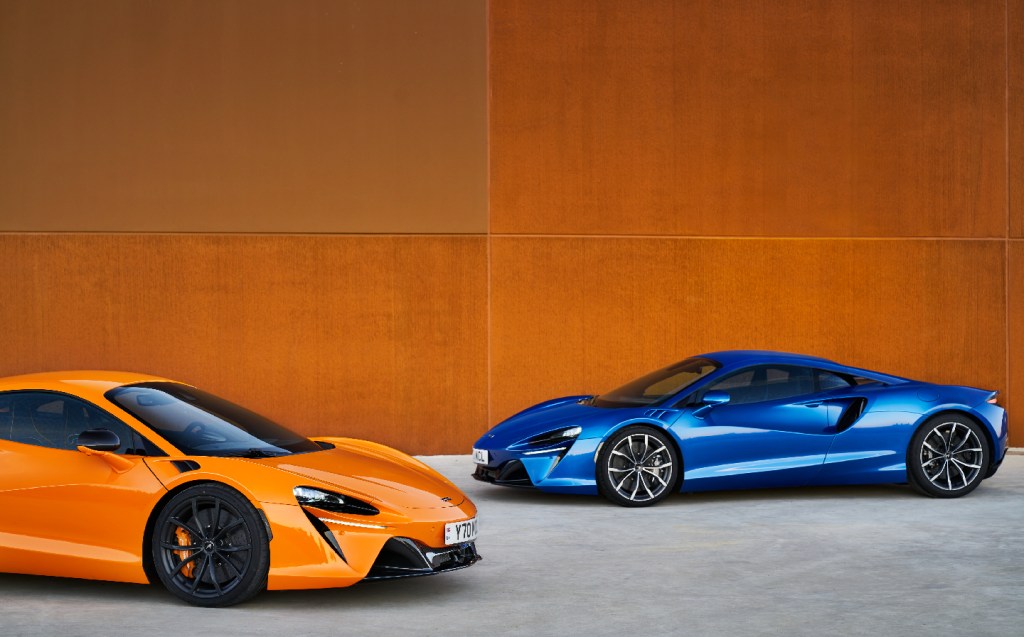
One of the surprising highlights of driving the Artura was going through villages in pure, silent, electric mode. It gave the pedestrians, residents, and I can even say the driver a welcome relief from the barking cacophony of the 3.0 litre V6 — a chance to take stock, calm down and wait for the road to open up again.
However, I have to say, I never once felt like I couldn’t dial down the GT whenever I wanted to and could amble along sedately when needed. If I ever ‘upset’ a fellow motorist or pedestrian, I didn’t see it. I also think the GT is a better-looking car. Let’s face it, most McLarens have a similar look — some would argue too similar – but, to my mind, the GT is the most attractive car of the current models. Grown up but still dramatic enough to draw the eye.

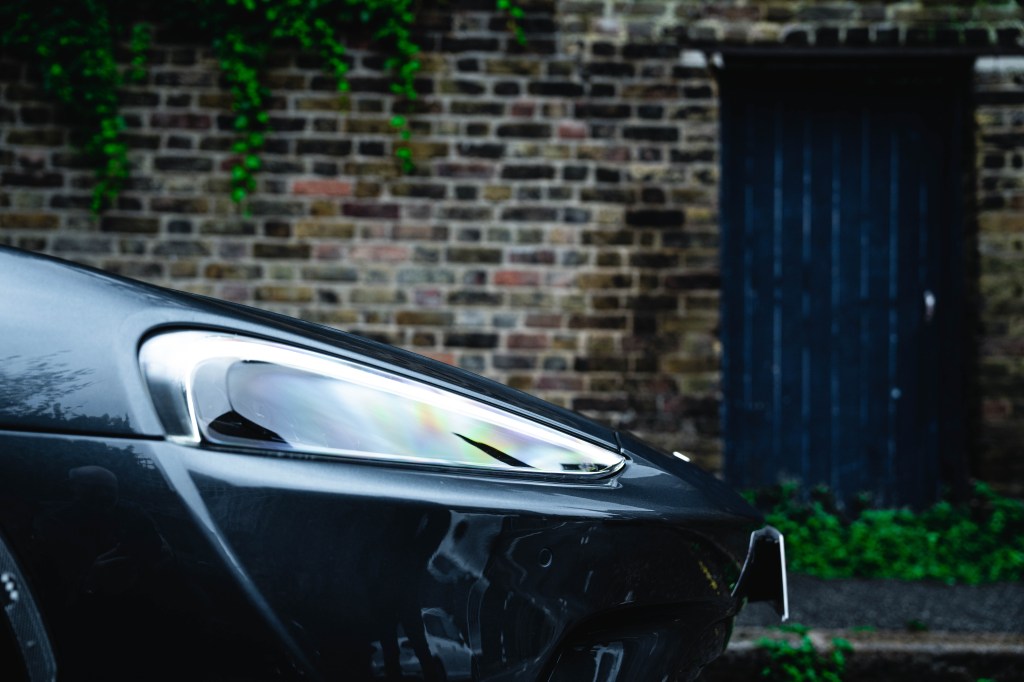
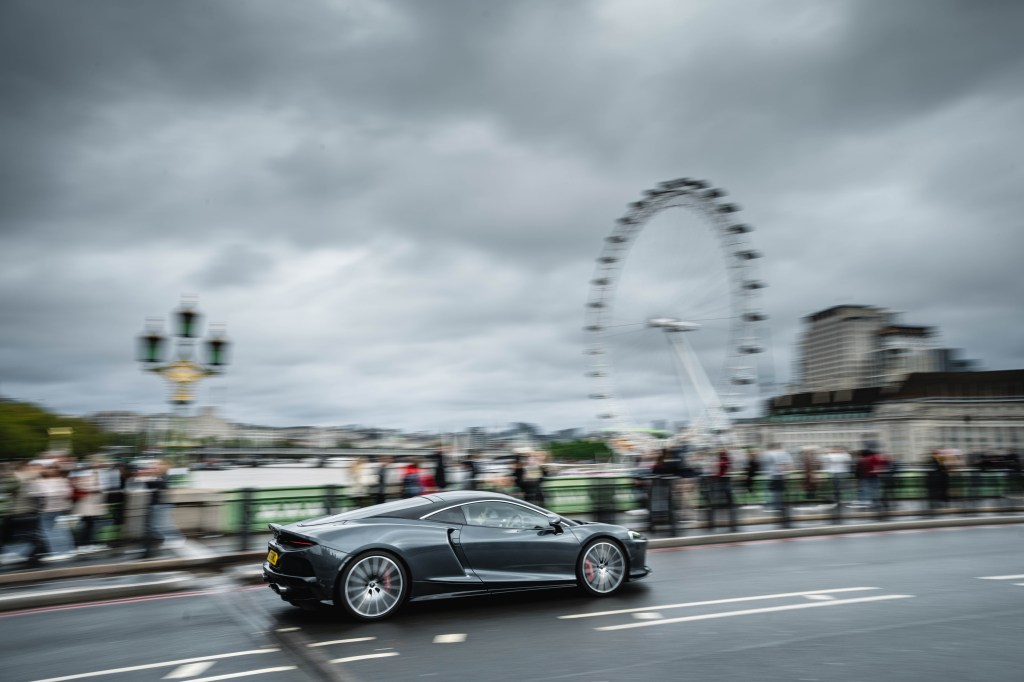
In further comparison to the Artura (or any other supercar), if you really want to use a high-performance car for extended trips away, the storage space in the GT really starts to win the argument. I have mentioned before that the shape of the 570 litres of storage is unconventional, but when used well, it is surprising how much stuff you can get in this car while still having the performance potential to lose your licence in almost every country on the planet.
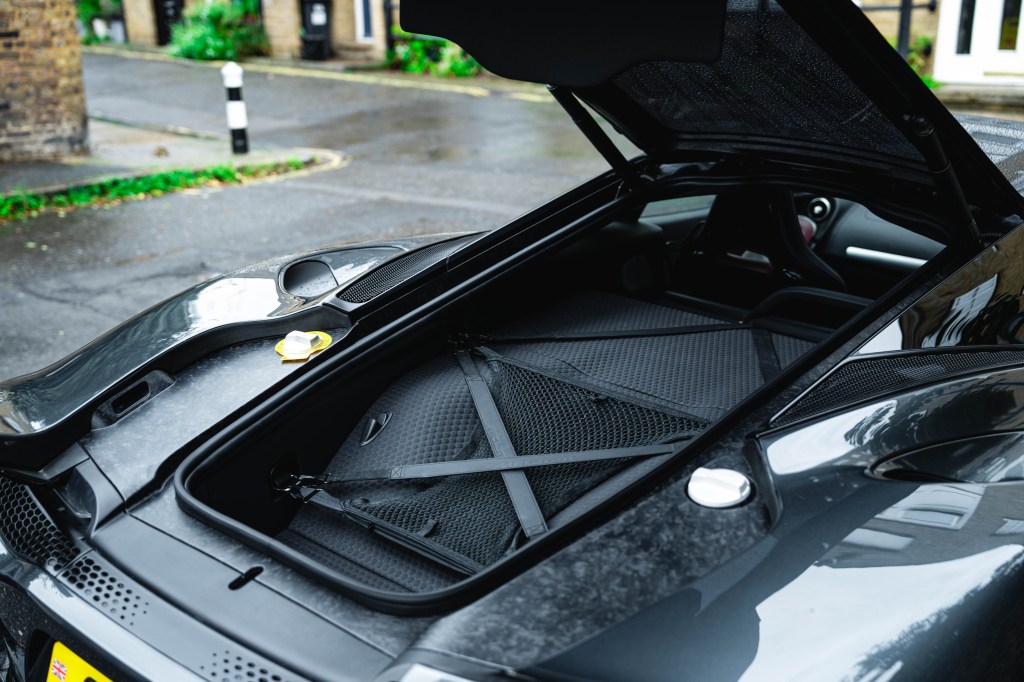
As if to prove the point, McLaren has teamed up with travel experts TUMI to create a new range of luggage. It’s not custom fitting for the GT, but you can easily fit a rucksack and a carry-on case in the compartment under the bonnet while still having room for a large suitcase in the rear. That’s not something you can say about almost every supercar, and as concluded in the last report, the GT is fractions away from that classification.
I’m not a keen golfer, so you won’t see me trotting out pics of how a set of golf clubs will neatly fit in the back of my GT, but I’ve got a feeling they will fit nicely… and after a quick Google search that seems to be correct. That will be important to some people.
- Miles to date: 1,821
- Average fuel economy: 22.1mpg
January 25, 2024: All good things…?
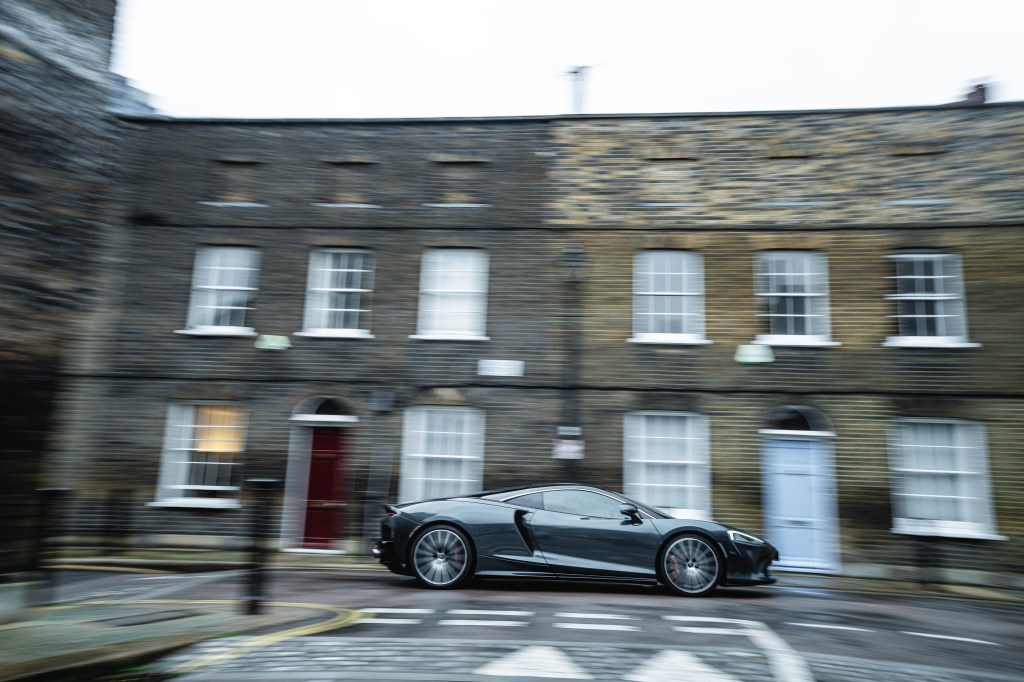
All good things come to an end, they say, though my time with the McLaren GT seems to have ended so quickly. Of course, the collection date wasn’t unexpected — it was agreed when I picked up the keys to this supercar… sorry grand tourer — it just seems that time has flown. That’s undoubtedly a good sign for the car itself.
Looking back over the last few months, I’ve realised that the GT is definitely a car you have to spend time with to appreciate fully. It is one that offers something different and possibly unique in the market.
I wouldn’t go as far as to say it is a practical proposition — although I did see 34.9 mpg on one journey (admittedly mostly on motorways on a constant throttle), and I have not seen that number on many SUVs under the same circumstances.
Downsides have been few. In my tenure, not one thing went wrong, nor did any warning light blink, putting to bed any niggling worries I had about McLaren build quality. A minor irritation was adjusting the steering wheel position whenever I got into the car. No memory position for the seat synced with my favoured wheel position. Yet I am happy to admit this may be the fault of the operator and not the car despite me reading and re-reading the manual to find a solution that worked.
The homegrown infotainment system with the relatively small (by today’s standards) portrait screen certainly lacks the complexity and features of some of its rivals. There is no Apple CarPlay, for instance, which will irritate some. However, it worked perfectly well, and I enjoyed how straightforward the system was.
And again, you find yourself making the argument that if you want an oak-panelled library version of a grand tourer, the options are out there for you, whereas the McLaren offers a different flavour for continent-crossing, one where you are maybe too engrossed in the drive to worry about the trinkets.
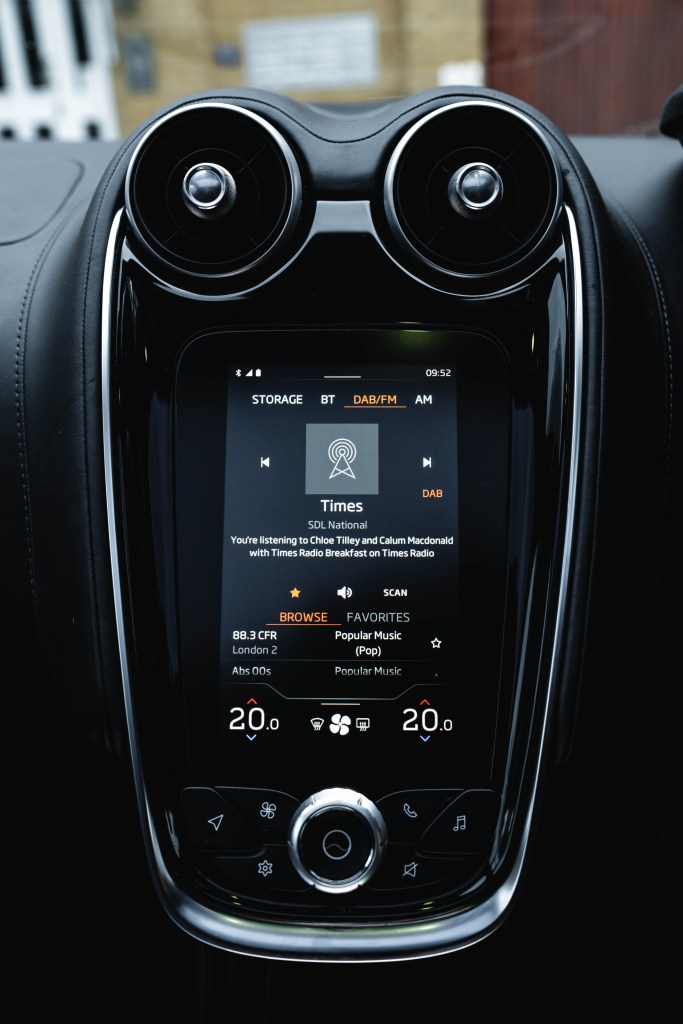
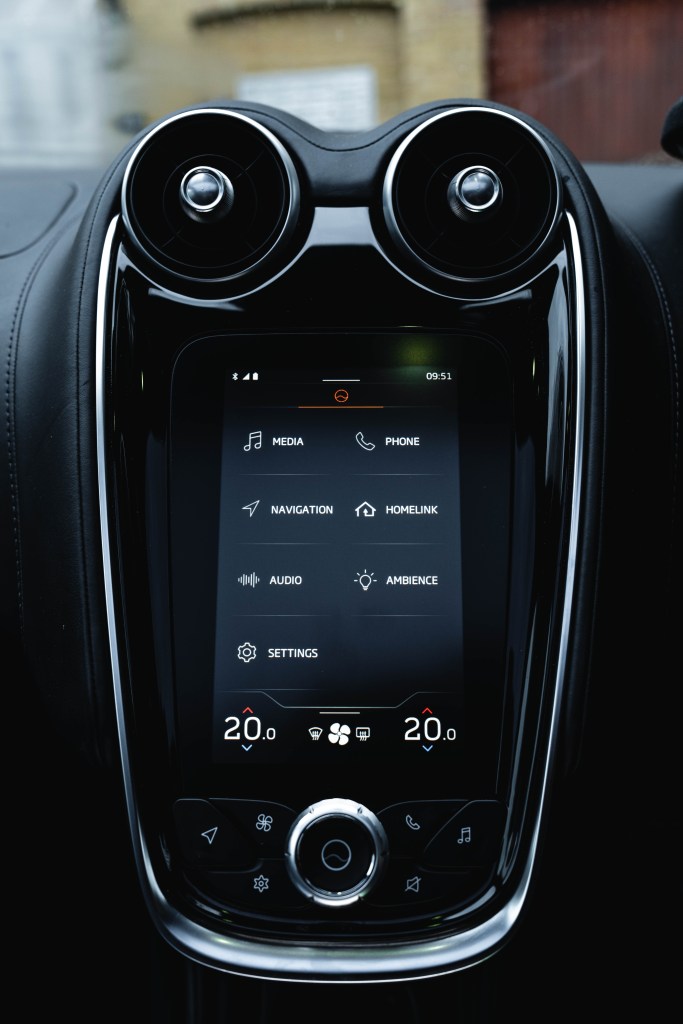
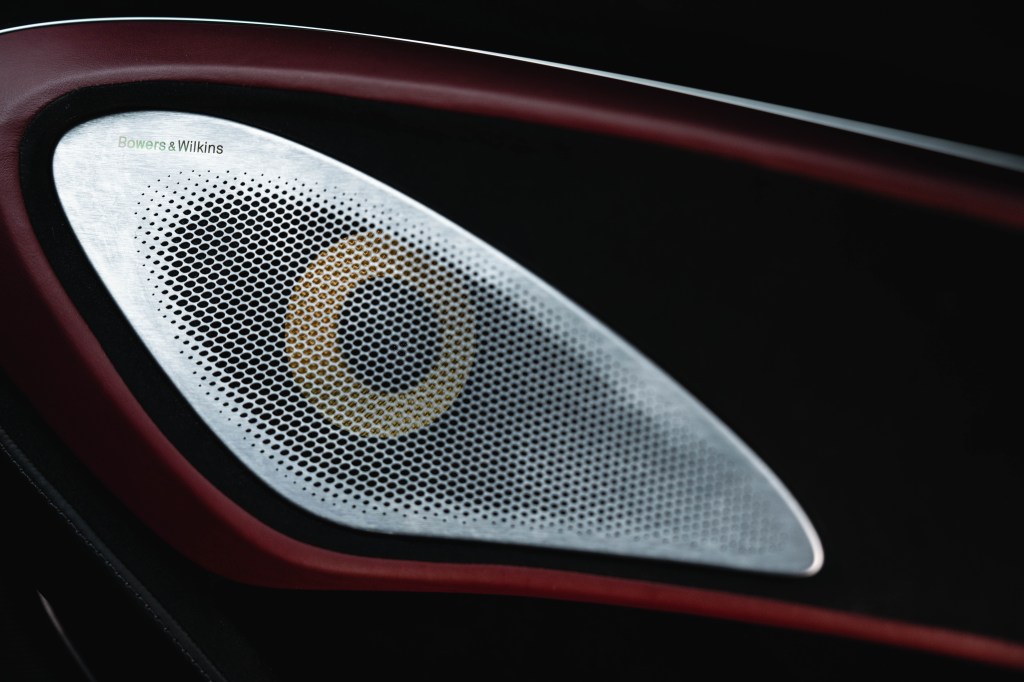
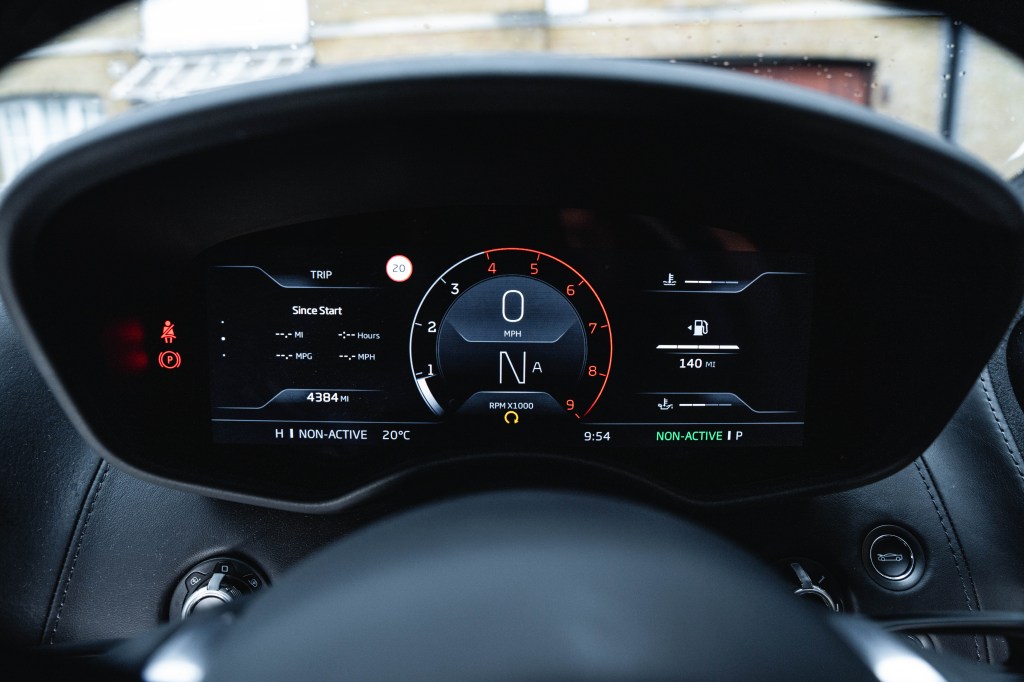
That’s not to say McLaren hasn’t attempted to soften the GT compared to its stablemates. It does have extra sound deadening, and materials to reduce unwanted vibrations and harshness, in areas such as the wheel arch liners, to distance the driver and passenger from the engine and road noise.
One answer to getting away from any remaining unwanted noises was to crank up the excellent Bowers and Wilkins 12-speaker audio system.
My final word on the GT must be on the performance and handling. I’ve spent a lot of time explaining how this McLaren is easier to live with than its other models, which generally behave like your hair is on fire. The GT offers more space and refinement than anything else in the range, but let’s face it, if you have chosen it over the other grand tourers out there, there is a good chance you have made that decision based on how it drives.
In that department and when compared directly to other GTs, the McLaren is phenomenal when you can turn up the wick. The carbon-tubbed, mid-engined two-seater is, unsurprisingly, a fantastic car to drive, offering true McLaren performance characteristics with only a slight offset to the brand’s pure supercars. One difference of note when compared with GT rivals is the driving feel, which contrasts greatly with the big front-engined brutes against which McLaren is pitching its effort.
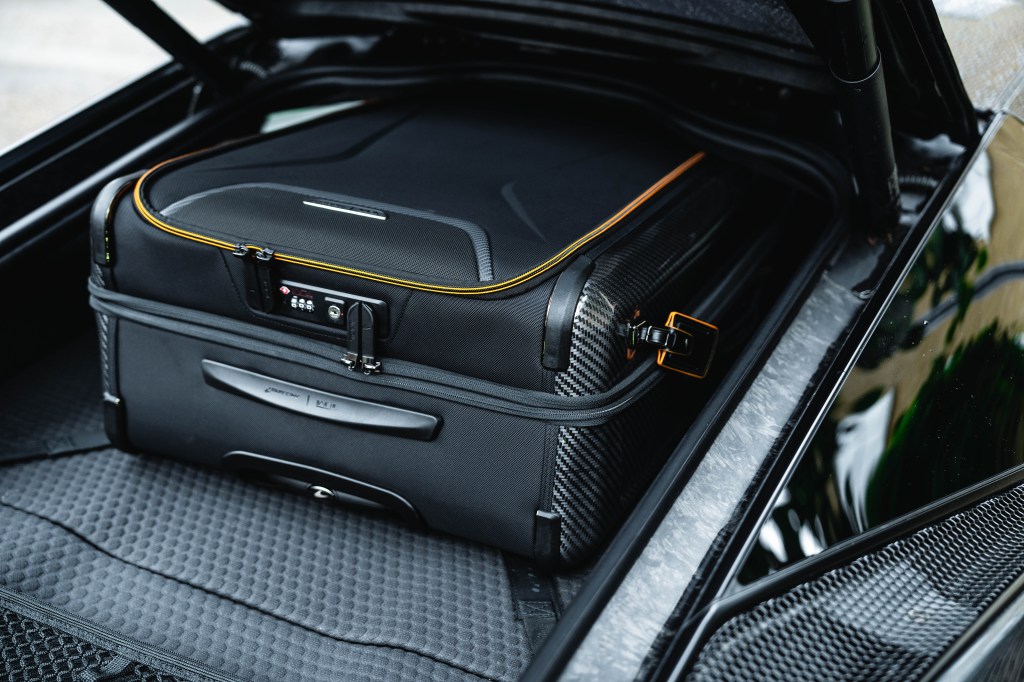

You may also choose the GT because of its rarity. It still feels special driving the McLaren, and you are unlikely to bump into another on your travels. And for diehard F1 fans, there is still the bloodline to the legendary team, however tenuous, that stirs the soul.
If the current grand prix team, with its two hotshoe drivers, can improve on last year’s season, McLaren is likely to continue to entice more buyers to try its road cars. And if touring continents is your thing, the GT is definitely a model we can recommend.
- Miles to date: 2,108 miles
- Average fuel economy: 23.7mpg
This extended test has now come to an end.
Related articles
- If you’re enjoying this extended review of the 2023 McLaren GT, you might like to take a look at our first drive review of the car by Will Dron
- Jeremy Clarkson would choose the McLaren Artura over a Ferrari 296 GTB
- McLaren unveils the track-only Solus GT, a single-seater with a jet fighter canopy and a screaming V10 engine
- Audi e-tron GT review 2021
Latest articles
- Should I buy a diesel car in 2025?
- F1 2025 calendar and race reports: The new Formula One season as it happens
- Zeekr 7X AWD 2025 review: A fast, spacious and high tech premium SUV — but someone call the chassis chief
- Denza Z9GT 2025 review: Flawed but sleek 1,062bhp shooting brake from BYD’s luxury arm
- Extended test: 2024 Renault Scenic E-Tech review
- Best-selling cars 2025: The UK’s ten most popular models of the year so far
- Audi A6 Avant 2025 review: Trusty executive estate ticks expected boxes, and there’s still a diesel option
- Keir Starmer eases pressure on carmakers to sell EVs in response to ‘global economic headwinds’
- Ferrari 12Cilindri Spider review: Heady blend of traditional and futuristic becomes even more intoxicating after lid is removed



